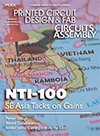SAN JOSE, CA — NextFlex®, America’s Flexible Hybrid Electronics (FHE) Manufacturing Institute, today announced $8.45 million in funding (including $4.25M in cost-share contribution from participants) for nine new projects as part of its Project Call 7.0 to further promote FHE development and adoption throughout the U.S. advanced manufacturing sector.
Project Call 7.0’s awarded projects represent a diverse and innovative set of companies and universities that are jointly focused on maturing the industry’s capabilities while leveraging the strong foundation established in prior Project Calls. Several projects in this latest round of funded projects focus on advancing additive manufacturing approaches for hybrid electronics and addressing critical needs in domestic advanced semiconductor packaging capabilities, which directly aligns with the needs described in the recently passed Creating Helpful Incentives to Produce Semiconductors (CHIPS) Act.
Project Call 7.0 also focuses on using hybrid electronics manufacturing processes and materials to improve environmental sustainability in electronics manufacturing. This will include using water-based inks and lower temperature processing, as well as assessing the manufacturing reshoring of low-cost single use medical devices that utilize more environmentally sustainable manufacturing approaches and materials.
This latest round of funding brings the total amount invested in FHE developments to more than $124M, including cost share contributions from Project Call participants.
“I am pleased to announce these important new projects, which will enhance the state of the art in hybrid electronics, support national efforts for semiconductor package manufacturing, and help to transition an increasing number of new capabilities into the U.S. industrial manufacturing sector for further advancement of the industry,” said Malcolm J. Thompson, PhD, Executive Director. “The NextFlex member community is accelerating FHE and additively manufactured electronics toward commercialization in a number of critical application areas addressed in these projects.”
Project Call 7.0’s awarded funding will go to:
- Development led by Lockheed Martin Advanced Technologies Laboratories for creation of FHE interposers for heterogeneous integration of a high-density fiber optic Multi-chip Module (MCM) for thinner interposers with finer feature capabilities.
- Development led by GE Research and Binghamton University for Radio Frequency (RF) Multi-chip Module (MCM) with embedded die, printed substrates, antennas, and interconnects for fast turn low loss, high thermal conductivity.
- Development led by Raytheon Missiles & Defense for printed interconnect solutions for microwave multichip packaging for improved die density.
- Development led by General Dynamics Mission Systems for additively manufactured, doubly curved multilayer circuits with active and passive components for embedded RF functionality in complex structures.
- Development led by Auburn University for sustainable, additively printed electronics through water-solvent inks, FHE repairability, and low temperature processing with high reliability.
- Development led by Auburn University for in-mold electronics interconnection and thermoforming for 3D-integrated applications including automotive, aerospace, and medical components and devices.
- Development led by GE Research and Binghamton University for manufacturing approaches for low-cost, sustainable single-use medical devices with cost and environmental life cycle assessment.
- Development led by UES, Inc. for creation of scalable manufacturing systems for ELMNT liquid metal inks for highly stretchable electronics applications.
- Development led by Sentinel Occupational Safety, Inc. for safety assessments of FHE wearable chemical and voltage sensors for risk-reduced industry adoption.
For more information about NextFlex and the Project Call program, please visit https://www.nextflex.us/project-call/













